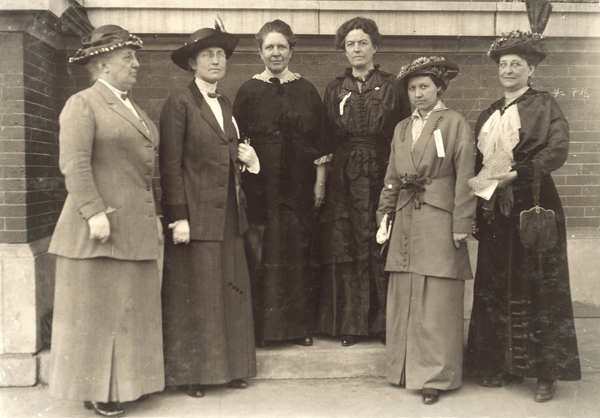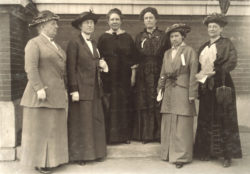Progressive Era in Louisiana
The Progressive movement that swept across the United States at the turn of the twentieth century brought changes to many of the nation's social and political institutions, including those in Louisiana.

Courtesy of Library of Congress Prints and Photographs Division
Factory Inspectors Past and Present. Hine, Lewis Wickes (Photographer)
The Progressive movement that swept across the United States at the turn of the twentieth century brought changes to many of the nation’s social and political institutions, including those in Louisiana. Yet, as it was in much of the South, Progressivism operated in the Pelican State in the face of prevailing social and political mores that proved, in the end, to be remarkably enduring. Thus, while Progressive reformers brought changes to the landscape in Louisiana, many of their triumphs had the dual purpose of maintaining familiar assumptions in a modern age.
Broadly defined, the Progressive movement – both as a grass-roots reform program and as a political organization – emerged at the turn of the twentieth century out of a growing popular belief in the need to address some of the late nineteenth century’s grossest abuses. The type of individuals most likely to embrace Progressivism were members of the white middle class, whose education and political inclinations led them to believe that society’s ills might be best solved with the rational application of scientific management. In concept, at least, the Progressives hoped to forge a more just republic; one that was responsive to the needs of its citizens and placed checks upon the unbridled power of corporate wealth, corrupt urban machines, and labor radicalism. In the social sphere, Progressives hoped to improve the lifestyles of groups as diverse as the nation’s recently arrived immigrant masses, Appalachia’s poor, and child laborers.
At its heart, Progressivism was a revolution by the middle class to reshape the rest of the nation in an idealized image of itself. While what constituted a Progressive issue varied from region to region, nobody could doubt the political success of the movement. By the time America had entered a new political paradigm in the 1920s, the Progressives appended four amendments to the U.S. Constitution, including the imposition of a national income tax, direct election of US Senators, prohibition, and women’s suffrage. Moreover, both the Presidencies of Theodore Roosevelt and Woodrow Wilson endeavored to shape both national and diplomatic policy based in Progressive principles.
Just as it had in the rest of the nation, Progressivism in Louisiana had built upon the foundations of earlier efforts to address social and political ills. Most, but not all of these movements had originated in New Orleans, where a reform element had hoped to impose white middle class values upon the electoral system by imposing literacy and other qualifications designed to purge illiterate, and in the reformers’ minds, unqualified voters from the rolls. This “good government impulse” for “electoral reform” culminated in the state constitution of 1898. Often known as Louisiana’s “disfranchisement” constitution, its newly imposed restrictions prevented most of the state’s black electorate from registering to vote. Yet in the mind of those who sought more sweeping reform, the document did not go far enough as it made provisions for the state’s poor whites through the so-called “grandfather clause” and had a special provision that exempted naturalized citizens so that the urban machine in New Orleans would not lose its power base of immigrant voters. Both the grandfather and naturalization clauses flew in direct opposition to true southern Progressive conceptions of “good government.” Indeed, the changes only served to entrench old corrupt interests. One issue in which Progressives could take heart, however, was that the document adopted the secret “Australian” style ballot, eliminating the pre-printing of straight-ticket ballots by the parties. This measure required, by definition, that the voter know how to read in order to make “his mark” by any given candidate. Such measures had a limited impact upon reducing fraud.
Probably the most prominent Progressive in Louisiana was New Orleanian John M. Parker. He was active in organizations such as the Crescent City’s Good Government League, which fought with only limited success against machine rule in the city. Parker’s difficulties in enacting Progressive reform in Louisiana were emblematic of the movement’s liabilities in the state in general. To go against the all-powerful Democratic Party, as he did in 1912 when he supported the “Bull Moose” Presidential Candidacy of Theodore Roosevelt, was to invite charges of political apostasy. This was the essential conundrum of Progressivism in the one-party South: to accomplish anything politically in Louisiana required the support of either the rural Democratic machine or Mayor Martin Behrman’s urban Choctaw Club that ran New Orleans, and sometimes both. By definition, true Progressivism eschewed the idea of machine rule. Thus, any hope that the Progressives might destroy machine rule was inherently in vain because the only hope that they had of putting other Progressive programs in place was to pursue them through the structure of the Democratic Party. Thus, the Progressive Parker, despite his considerable portfolio as a reformer, was only able to attain Louisiana’s gubernatorial chair in 1920 by running as a Democrat.
As issues adopted by Louisiana’s Democratic Party, many Progressive programs became law. Prohibition, one of the major Progressive movements to not originate in New Orleans, made steady inroads in the state legislature during the first decade of the twentieth century when promoted by upstate legislators. By the time the Louisiana Legislature met in a contentious session to ratify the Volstead Act in 1918, over eighty-five percent of the Pelican State’s parishes had gone “dry.” Prohibition is just one of many issues, however, that show the paradoxical nation of Progressivism in the nation, region, and in Louisiana. Running unsuccessfully as a Progressive for governor in 1916, Parker, a New Orleanian and member of the inner circle of Carnival royalty, was a “wet.” The issue of Prohibition, combined with the power of the Democratic Party, placed his dry rival, Ruffin Pleasant, in office. It is worth noting that in northern Louisiana, the Ku Klux Klan became a prominent factor in enforcing such “morality” legislation passed by Progressives, particularly prohibition. This led most infamously to the Mer Rouge incident of 1922, in which two prominent young men were in all likelihood murdered by the Klan of Morehouse Parish for running afoul of their reign of terror.
On a day-to-day basis, Progressives were probably most successful at meeting with public approval when they attacked ready and tangible threats to public health and well being. Two sisters in New Orleans, Kate and Jean Gordon, became staunch advocates of cleaning up the city’s notoriously filthy sewer conditions and were instrumental in the creation of the sewage and water board, which would finally give the city clean drinking water. For the Gordon sisters, these quality-of-life crusades would bleed over into other Progressive causes.
Another Progressive issue that became law in Louisiana was one in 1912 protecting against abusive child labor. The great irony of this law is that not only was it not used to prevent poor children of all races from laboring in the Pelican state’s many farm fields, but that its most prominent test cases came when Jean Gordon, then working as a labor inspector made it her crusade to prosecute theater managers for employing child actors in the city’s many theatrical productions. The issue was emblematic of the sort of abuses that could emerge when a handful of strident Progressives, armed with a vaguely worded law, could meddle in the affairs of others. Gordon’s prosecutions may have removed the scourge of child thespians from Louisiana, but her efforts were undermined in 1919 when the legislature enacted a loophole that allowed them to return to the stage.
Louisiana’s circuitous route toward women’s suffrage, too, represents the paradox of Progressivism in the Pelican State. Kate Gordon, the most prominent advocate of the issue in Louisiana, championed not the national amendment as promoted by national Progressives, but instead as a proposed state measure. The logic behind the decision was inherently southern and segregationist. Gordon argued that in giving white women the ballot, Louisiana would reinforce its measures designed to eliminate black electoral significance. Middle-class white women, argued Gordon, possessed the educational background necessary to meet requirements such as literacy tests and the means to pay poll taxes, whereas most black men did not. Moreover, to pass a state law, rather than to support federal legislation, was to stand true to the southern principle of states’ rights. When the state legislature failed to pass female suffrage in 1918, Gordon paradoxically refocused her efforts against the passage of the Twentieth Amendment to the US Constitution, for its federalism ran counter to the principles of southern Progressivism.
Progressivism in Louisiana did bring tangible results to the state, however. A theme popular in most southern states in the first two decades of the twentieth century, the “good roads campaign” in Louisiana saw the paving of hundreds of miles of dirt roads with gravel. During the gubernatorial term of John M. Parker, the state moved the campus of what we recognize today as Louisiana State University to a large parcel of land just south of Baton Rouge. This move, combined with significant building appropriations, put the university on a path to becoming one of the region’s premiere institutions of higher learning.
Perhaps the most debilitating factor of Progressivism, however, was that it gave “scientific” sanction to segregation in almost every aspect of life. The attitude that segregation was beneficial to the smooth operation of society was one shared by many white Americans not only in the South, but also across the nation. Since Progressivism was about forging social harmony, separating races that, under current white supremacist ideologies, could not live together without discord marked an important move in that direction. The same logic applied to voter disfranchisement. Under this paradigm, Progressive city councils in Louisiana cities of any size enacted segregated residential and commercial zones, separating a people who had culturally lived amongst one another for generations.
Progressivism, as it was in the rest of the nation, represented a mixed bag in Louisiana. This was due in no small part to the confused nature of Progressivism itself. Scientific management could be used equally to advance education and protect child laborers as it could be used to impose restrictive moral codes and segregation on an unwilling populace. Yet it also awakened a new generation to the perils and possibilities of political action in Louisiana, and in doing so it presaged the emergence of a young politician who held an on-again off-again dalliance with Progressivism by the name of Huey Pierce Long.
